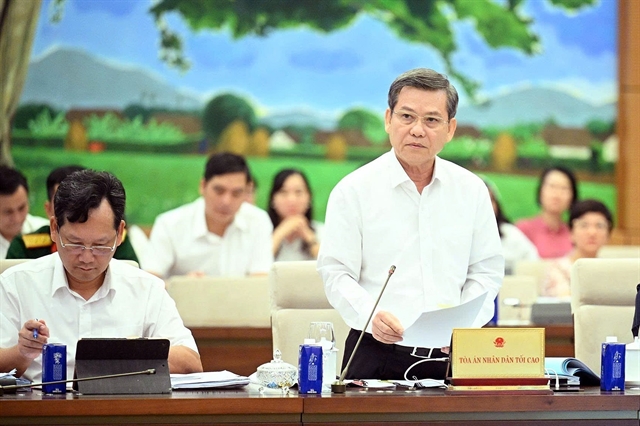 Politics & Law
Politics & Law


|
| Chief Justice of the Supreme People's Court Lê Minh Trí speaks at the session. — VNA/VNS Photo Doãn Tấn |
HÀ NỘI — The National Assembly (NA) Standing Committee on Tuesday morning offered opinions on a number of amended laws including the restructuring of the court system.
The contents in work included the amended Law on Organisation of People's Courts, the amended Civil Procedure Code, the amended Law on Administrative Procedure, the amended Law on Juvenile Justice, the amended Law on Bankruptcy and the amended Law on Mediation and Dialogue at Court.
Presenting a report on the draft amended Law on Organisation of People's Courts, Chairman of the NA's Committee on Law and Justice Hoàng Thanh Tùng said that the committee basically agreed with the contents that the Supreme People's Court had revised.
Specifically, the committee agreed with regulations on organising the people's court according to a three-level model, including the Supreme People's Court, provincial People's Court, and regional People's Court.
The regulations also redefine the tasks and powers of people's courts at all levels, supplementing the tasks and powers of the Chief Justice of the provincial People's Court.
Regarding the Specialised Court, the committee found that the establishment, organisation and operation of the Specialised Court under the International Finance Centre in Việt Nam is a new, difficult and unprecedented issue.
Furthermore, to ensure competitiveness and compliance with international practice, the Specialised Court are expected to be completely different from those of current People's Courts, such as trial and debate in English, inviting foreign judges to participate in trials.
Meanwhile, the Supreme People's Court has just begun to research this issue under the direction of competent authorities. At the same time, the draft amended Law on Organisation of People's Courts will be submitted to the NA for consideration and approval at the ninth session according to shortened procedures, thus there is not much time left.
Therefore, to promptly institutionalise the Politburo's directive, the committee basically agrees with the proposal of the Supreme People's Court, which only stipulates in the Law on Organisation of People's Courts basic issues related to the Specialised Court, while specific contents will be further studied by the Supreme People's Court and submitted to the NA later.
Speaking at the session, NA Chairman Trần Thanh Mẫn emphasised that the amended Law on Organisation of People's Courts was to serve the apparatus streamlining, so it was necessary to clarify the regulations on the jurisdiction of regional People's Courts, especially the transitional regulations to ensure that the transferring tasks and powers process would take place smoothly, without affecting the rights of organisations and individuals.
He noted that it was necessary to focus on handling existing assets and facilities, as well as investing in modern equipment and local judges for the restructuring phase.
"If judges and court officials have the heart, vision, talent and virtue, they will be able to meet the requirements of trial in the current situation, creating trust among people and businesses," said the NA Chairman.
He suggested that in the upcoming arrangement, not only the court but also relevant agencies must have a plan to proactively use existing facilities to avoid waste and avoid the situation of "lack new facilities while old ones are not fully used".
Clarity and transparency
Also in the session, giving opinions on different draft amended laws, the NA Standing Committee highly appreciated the working spirit of the examining agency and the drafting agency, and agreed with the content of the draft laws.
According to the NA’s Committee on Law and Justice, regarding the jurisdiction of the regional People's Courts and the provincial People's Courts, the committee has coordinated with the Supreme People's Court and agencies to revise the draft law to ensure greater clarity and transparency.
Specifically, the Civil Court under the regional People's Court has the authority to resolve and try at first instance for labour cases. The Intellectual Property Court under regional People's Courts has the authority to resolve at first instance for civil, business and commercial cases regarding intellectual property rights and technology transfer.
The Bankruptcy Court under regional People's Courts has the authority to resolve bankruptcy requests.
The NA Standing Committee will specify the Intellectual Property Court and the Bankruptcy Court under regional People's Courts, and will stipulate territorial jurisdiction of the Intellectual Property Court and the Bankruptcy Court under regional People's Courts.
The Economic Court under provincial People's Court has the authority to resolve, according to the appellate procedure, cases in which civil judgments on intellectual property rights and technology transfer have not taken legal effect and are appealed or protested. — VNS




